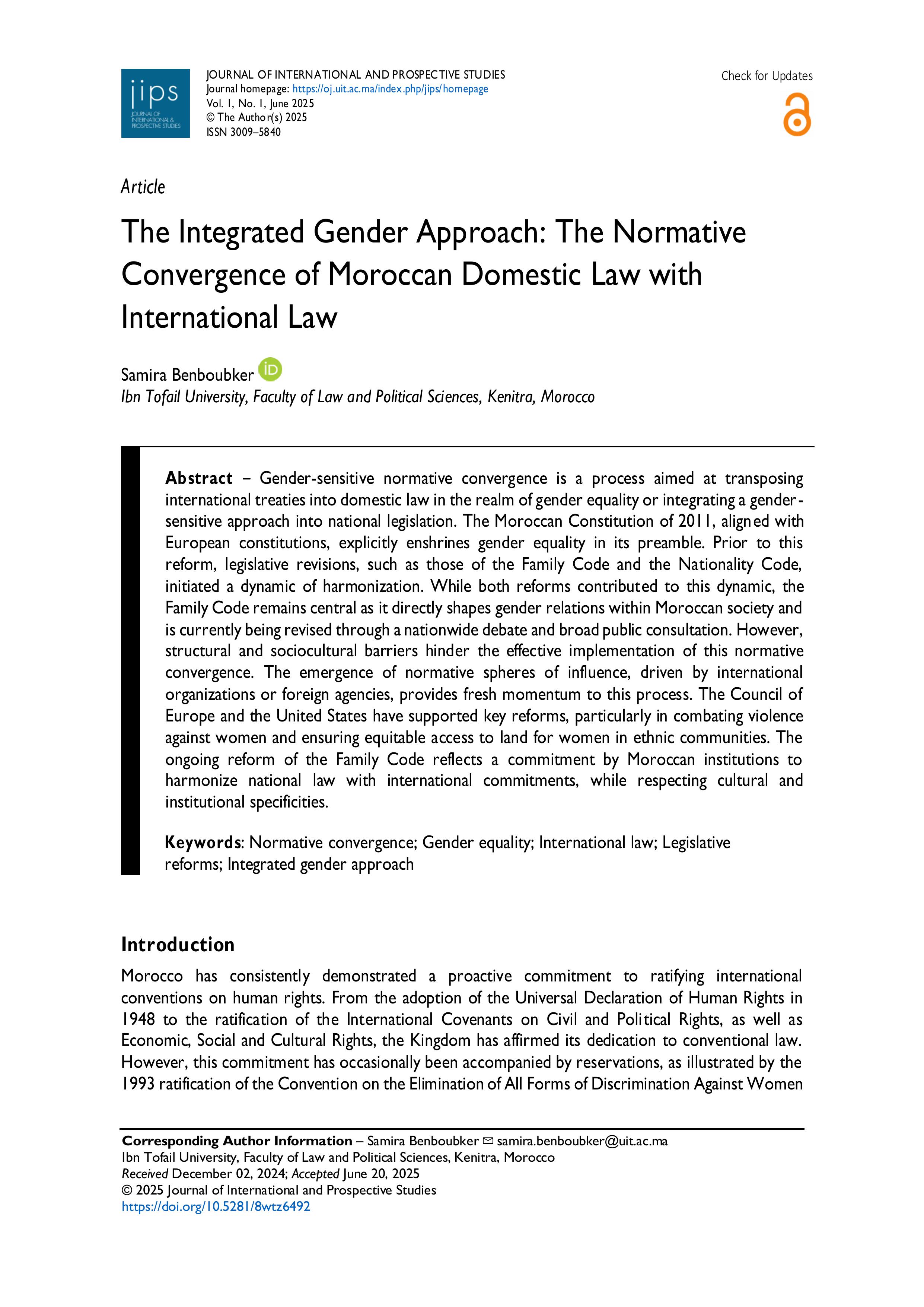The Integrated Gender Approach: The Normative Convergence of Moroccan Domestic Law with International Law
DOI:
https://doi.org/10.5281/8wtz6492Keywords:
Normative convergence, Gender equality, International law, Legislative reforms, Integrated gender approachAbstract
Gender-sensitive normative convergence is a process aimed at transposing international treaties into domestic law in the realm of gender equality or integrating a gender-sensitive approach into national legislation. The Moroccan Constitution of 2011, aligned with European constitutions, explicitly enshrines gender equality in its preamble. Prior to this reform, legislative revisions, such as those of the Family Code and the Nationality Code, initiated a dynamic of harmonization. While both reforms contributed to this dynamic, the Family Code remains central as it directly shapes gender relations within Moroccan society and is currently being revised through a nationwide debate and broad public consultation. However, structural and sociocultural barriers hinder the effective implementation of this normative convergence. The emergence of normative spheres of influence, driven by international organizations or foreign agencies, provides fresh momentum to this process. The Council of Europe and the United States have supported key reforms, particularly in combating violence against women and ensuring equitable access to land for women in ethnic communities. The ongoing reform of the Family Code reflects a commitment by Moroccan institutions to harmonize national law with international commitments, while respecting cultural and institutional specificities.
Downloads
References
Benboubker, S. (2023). The impact of gendered disinformation on inheritance equality in Morocco. Study on the theme "Preventing and Addressing Disinformation Against Women and Girls." ODIL platform. https://odil.org/ressource/limpact-de-la-desinformation-genree-sur-legalite-successorale-au-maroc/
Bendourou, O. (2011). The new Moroccan Constitution of July 29, 2011. Revue française de droit constitutionnel, 91, 511–535. https://doi.org/10.3917/rfdc.091.0511
Bendourou, O. (2012). The new Moroccan Constitution of July 29, 2011. French Review of Constitutional Law, 91(3), 535.
Bendourou, O. (2014). Human rights in the 2011 Moroccan Constitution: Debates on certain rights and freedoms. La Revue des droits de l’homme, (6). https://doi.org/10.4000/revdh.907
Berriane, Y. (2013). Chapter 5. The inclusion of women: The contours of a new norm. In Women, associations, and politics in Casablanca. Centre Jacques-Berque. https://doi.org/10.4000/books.cjb.364
Berriane, Y., & Rignall, K. (2017). La fabrique de la coutume au Maroc : Le droit des femmes aux terres. Cahiers du Genre, 2017(1), 97–115. https://shs.cairn.info/revue-cahiers-du-genre-2017-1-page-97?lang=fr
Chekrouni, N., & Jaldi, A. S. (2024, March). The Moroccan Family Code (Moudawana): Realities and reform perspectives (Research Paper, p. 32). Policy Center for the New South.
Constitutional Court of the Kingdom of Morocco. (2011, November 13). Decision No. 817/11 on equal opportunities and non-discrimination. https://www.cour-constitutionnelle.ma/Decision?id=817
Constitutional Court of the Kingdom of Morocco. (2011, November 18). Decision No. 820/11 on gender equality and parity. https://www.cour-constitutionnelle.ma/Decision?id=820
Council of Europe. (2022). Neighbourhood Partnership between the Kingdom of Morocco and the Council of Europe 2022–2025: Joint roadmap (p. 14). https://rm.coe.int/partenariat-de-voisinage-avec-le-maroc-2022-2025-fr/1680a80cab
Economic, Social, and Environmental Council (CESE). (2023, December 21). Opinion on the issue of child marriage and its impact on the economic and social situation of girls (SA-C3-2023-35-f, p. 14).
Filali Meknassi, R. (1994). Social transformations and legal mutations in Morocco. In Legislative policies: Egypt, Tunisia, Algeria, Morocco. CEDEJ - Egypt/Sudan. https://doi.org/10.4000/books.cedej.392
Francophone Association of Constitutional Courts (ACCF). (2014). Proceedings of the 7th Conference: The supremacy of the Constitution. Moroccan Constitutional Court, p. 461. https://accf-francophonie.org/publication/actes-du-7e-congres/
Khettou, K. (2024, March 4). Reforming the Family Code: The CNDH and the USFP counter Benkirane. Hespress. https://fr.hespress.com/355471-reforme-du-code-de-la-famille-le-cndh-et-lusfp-contre-attaquent-benkirane.html
Kingdom of Morocco. (2016). Law No. 24-16 establishing the Millennium Challenge Account-Morocco Agency (MCA-Morocco), promulgated by Dahir No. 1.16.142 of 21 Dou Al Qiida 1437 (August 25, 2016). Official Bulletin of the Kingdom of Morocco.
Le Matin. (2022). Fête du Trône : Voici le discours intégral de SM le Roi Mohammed VI. https://lematin.ma/express/2022/fete-tro-voici-discours-integral-sm-roimohammedvi/379166.html
Le Matin. (2022). Throne Day: Here is the full speech of His Majesty King Mohammed VI. https://lematin.ma/express/2022/fete-tro-voici-discours-integral-sm-roi-mohammed-vi/379166.html
Le Matin. (2023). Family Code: Royal instructions to expedite the revision. https://lematin.ma/activites-royales/code-de-la-famille-instructions-royales-pour-activer-la-revision/193407
MAP Express. (2022). The House of Representatives unanimously adopts the draft organic law setting the conditions and procedures for the exception of unconstitutionality of a law. https://www.mapexpress.ma/actualite/activites-parlementaires/chambre-representants-adopte-lunanimite-projet-loi-organique-fixant-les-conditions-procedures-lexception-dinconstitutionnalite-dune-loi/
Medias24. (2024, February 1). Reform of the Moudawana: The perspective of a committed constitutionalist, Nadia Bernoussi. https://medias24.com/2024/02/01/reforme-de-la-moudawana-la-lecture-dune-constitutionnaliste-engagee-nadia-bernoussi/
Melloni, D. (2013). La Constitution marocaine de 2011 : Une mutation des ordres politiques et juridiques marocains. Pouvoirs, 145, 13. Éditions du Seuil.
Melloni, D. (2013). The 2011 Moroccan Constitution: A transformation of Morocco's political and legal orders. Pouvoirs, 145, 16. Éditions du Seuil.
Ministry of the Interior. (2009, July 23). Circular No. 2620 on equality in land rights between men and women in the Kenitra province. Kingdom of Morocco. https://samirabenboubker.com/Cours/droit-foncier/Lecons/chapitre-2-la-typologie-des-regimes-fonciers-au-maroc/
Morocco. (2017). Dahir No. 1-17-47 of 30 Hija 1438 (September 21, 2017) promulgating Law No. 79-14 on the Authority for Parity and the Fight Against All Forms of Discrimination.
Mouline, M. T. (2013, May). Maroc–Europe : La convergence réglementaire – acquis et limites. Paper presented at the seminar organised by l’Association Ribat Al Fath and the Konrad Adenauer Foundation. Institut Royal des Études Stratégiques (IRES), Rabat, Morocco.
Official Bulletin of Morocco. (2007). Law No. 62-06 promulgated by Dahir No. 1-07-80 of March 23, 2007 - 3 Rabii I 1428. Official Bulletin, No. 5514, April 5, 2007.
Tak-Tak, H. (2017). Introduction. In H. Tak-Tak (Ed.), Moroccan nationality (pp. 9–17). Casablanca: En toutes lettres. “Law and Citizenship” Series. https://www.cairn.info/la-nationalite-marocaine--9789954392706-page-9.htm

Downloads
Published
Issue
Section
License
Copyright (c) 2025 Samira Benboubker (Author)

This work is licensed under a Creative Commons Attribution-NonCommercial 4.0 International License.

